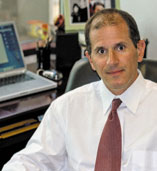
Alumni Newsmakers | '30s | '40s | '50s | '60s | '70s | '80s | '90s | '00s | A Supreme Clerkship | Setting Precedent for Sept. 11 Victims | Making Headlines | Alumnus Named GW Trustee | An International Veteran | Icing on the Cake | Alumni Bookshelf | In Memoriam
Setting Precedent for Sept. 11 Victims
 While thousands of family members of those killed or injured on Sept. 11, 2001, contemplate their legal options, approximately 20 attorneys are preparing for the first round of cases that will be handled through the federal victim compensation fund, set up by the government last year. Paul Scrudato, JD ’85, is one of them.
While thousands of family members of those killed or injured on Sept. 11, 2001, contemplate their legal options, approximately 20 attorneys are preparing for the first round of cases that will be handled through the federal victim compensation fund, set up by the government last year. Paul Scrudato, JD ’85, is one of them.
In September, Congress established the Sept. 11 Victim Compensation Fund, designed to provide a way to compensate victims who were physically injured or lost loved ones during the terrorist attacks on Sept. 11, 2001. Despite the name, there is no “fund,” technically. All compensations are paid directly from the U.S. Treasury, Scrudato says. Most family members who opt to go through the fund are guaranteed some level of compensation, but in doing so they waive their right to sue other parties.
Through Trial Lawyers Care, a pro bono arm of the Association of Trial Lawyers of America, Scrudato and the other lawyers have volunteered their time to handle the fund’s lead cases and work with federally appointed special master of the fund, Kenneth Fineburg. Together, they hope to establish the fund as the main venue in which victims can receive compensation from Sept. 11 while obtaining pro bono legal assistance.
“ATLA didn’t want there to be this mad rush by trial lawyers to go out and sue everybody under the sun because of the 9/11 tragedy,” Scrudato says. “So they and the New York County Trial Lawyers set up Trial Lawyers Care to help the victims. This is a time when lawyers should really step up to the plate. As I heard the president of ATLA say, ‘If a fireman could run into a burning World Trade Center, I can volunteer my time to help his family.’”
These lead cases obviously will set the precedent for all futures cases that come through the fund. Fineburg is working closely with Scrudato and the other attorneys to see that a representative sampling of issues is seen at the forefront of the fund’s work.
Scrudato, in solo practice since 1997 after serving as the head of the New York office of Chicago-based firm Schiff Harden & Waite, has discovered first hand the complexity of these lead cases. It took him nearly three solid weeks just to complete the application.
Scrudato is representing the family of a New York emergency medical technician, Mario Santoro, who died as a result of the attack on the World Trade Center. He left behind a 30-year-old widow and a 2-year-old daughter. “Mario got there just after the first plane hit, and we know he was there for an hour helping people. He and his wife had a modest income from his work as an EMT, and so the fund recovery will give his wife and daughter financial security and protection. Without the recovery, it would have been difficult for his wife, Lenore, to make ends meet as a part-time school teacher, and litigation could have dragged on for years.”
After assisting the Santoro family, Scrudato plans to help the family of another EMT from Cornell Hospital.
“After I got involved in representing Lenore and [daughter] Sophia, I and all the other lead lawyers learned that representing 9/11 victims would be 10 times the work we anticipated. We also learned that our personal satisfaction would be 10 times as great. It has been an honor to be a part of this process as it represents the best part of the legal community.”
—Heather O. Milke